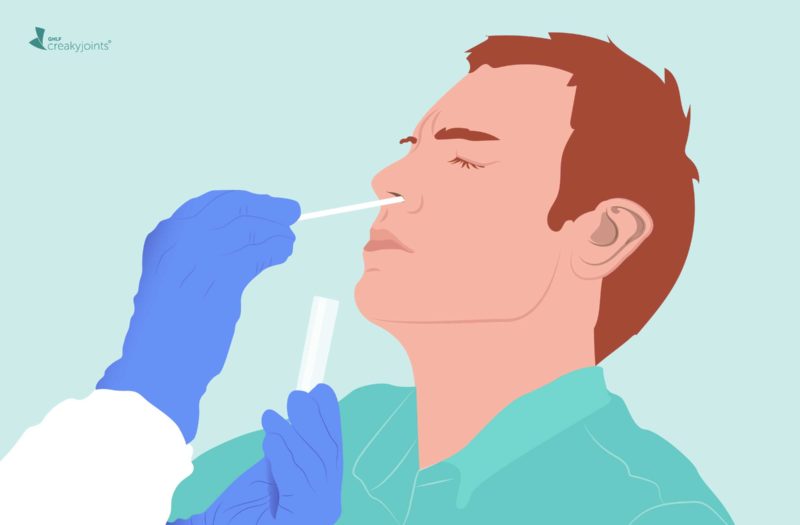Learn more about our FREE COVID-19 Patient Support Program for chronic illness patients and their loved ones.
Most people with COVID-19 get better within weeks, but some have to deal with lingering health problems for weeks — and even months — after being infected with the virus. According to the Mayo Clinic, the symptoms of the condition, known as long COVID, can include fatigue, brain fog, shortness of breath, heart palpitations, joint pain, and more — all of which may be of particular concern if you have an underlying condition and are already coping with chronic symptoms.
New research, however, shows that being vaccinated can reduce your chances of having long COVID even if you do get infected or experience a breakthrough case.
For the study, which was published in the Lancet, researchers assessed data from more than 1.2 million adults in the COVID Symptom Study, an app in which volunteers record their symptoms, test results, and vaccination records. The participants in the study included those who received either the Pfizer, Moderna, or AstraZeneca vaccine and a control group of unvaccinated people. Long-term symptoms of COVID were those that lasted at least four weeks after infection.
Researchers found that the odds of having long-term COVID-19 symptoms (at least 28 days or more after infection) were approximately halved among those who were fully vaccinated compared to people who were unvaccinated.
They also found that of the almost 1 million fully vaccinated adults, only 0.2 percent experienced a breakthrough infection. Those who did have breakthrough infections were about twice as likely to be asymptomatic as those who were unvaccinated and infected.
The risk of being hospitalized was also 73 percent lower in participants with breakthrough infections than those who were unvaccinated and infected, compounding the importance and effectiveness of the vaccines overall.
These results are particularly important because there are no clear treatments for long COVID yet, furthering the message that getting vaccinated is an important preventive measure against COVID-19’s lingering effects.
“Our best bet is to try to prevent it from happening in the first place,” says Claire Steves, PhD, a lead author of the study. “We already know that vaccination really helps to reduce the chance of catching COVID in the first place — so that will be already reducing the numbers of people going on to get long COVID. That’s why I say it’s an important prevention strategy for all of us.”
That said, some groups may be more vulnerable to breakthrough infections than others.
“We also see from this research that people who are frailer and have other conditions, such as heart, lung, and kidney disease, might be more vulnerable to getting breakthrough infection,” says Dr. Steves. “This means that if you are visiting people who are vulnerable, you need to get tested test to make sure you don’t unwittingly pass it on.”
Long COVID is difficult to study since its symptoms can range widely in type and severity, both of which are limitations of the study. Still, the study results show promise that vaccines can not only help you avoid getting infected with COVID-19, but also the long-term consequences.
These findings may be particularly meaningful for those with chronic conditions who already cope with persistent symptoms.
“If you are living with another long-term condition like rheumatoid arthritis, you may already be familiar with fatigue, a common symptom in long COVID,” says Dr. Steves. “It will be particularly important for you to avoid adding to this by getting long COVID, so the news that vaccines can prevent long COVID might be particularly relevant.”
Get Free Coronavirus Support for Chronic Illness Patients
Join the Global Healthy Living Foundation’s free COVID-19 Support Program for chronic illness patients and their families. We will be providing updated information, community support, and other resources tailored specifically to your health and safety.
COVID-19 (coronavirus): Long-term effects. Mayo Clinic. May 6, 2021. https://www.mayoclinic.org/diseases-conditions/coronavirus/in-depth/coronavirus-long-term-effects/art-20490351.
Interview with Claire Steves, PhD, Senior Clinical Lecturer at King’s College London and lead author of the study
Steves CJ, et al. Risk factors and disease profile of post-vaccination SARS-CoV-2 infection in UK users of the COVID Symptom Study app: a prospective, community-based, nested, case-control study. The Lancet. September 1, 2021. doi: https://doi.org/10.1016/S1473-3099(21)00460-6.






